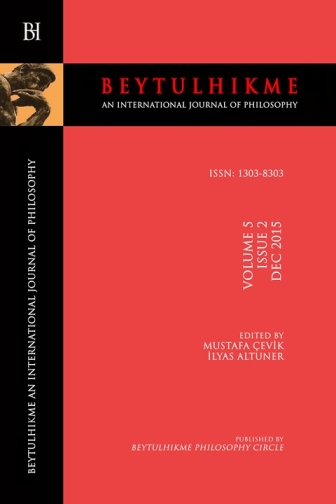Author :
Abstract
Bu çalışmada geç dönem Wittgenstein felsefesinin postyapısalcı/postmodern felsefeye devreden mirası Richard Rorty ve Luce Irigaray özelinde tartışılmaktadır. “Özdeşlik”ten ziyade “fark” vurgusunun öne çıktığı bu dönemle (dil oyunu) Wittgenstein, Rorty’ye Kartezyen geleneğin “büyük aynasıyla” –özellikle temsil nosyonu- hesaplaşma imkânı sağlar. Irigaray ise Wittgensteincı jargonla Batı metafiziğinin hükmedici-dil oyunları kavramının eril yapısını tahrip ederek yaratıcı bir fark vurgusu eşliğinde dişil bir söylemin imkânını soruşturur. Bu bağlamda aynı zamanda çalışmamız iki postyapısalcı/postmodern düşünürün kendi felsefi mahallerindeki Wittgenstein izleğine de odaklanacaktır.<
Keywords
Abstract
In this study, the legacy of late Wittgenstein’s philosophy turned over poststructuralist/postmodern philosophy is discussed in Richard Rorty and Luce Irigaray in particular. In this period with its prominent emphasis on “difference” rather than “identity” (language game) Wittgenstein enables Rorty to square accounts with “the great mirror” ¦especially the notion of representation¦ of Cartesian tradition. And Irigaray, in Wittgensteinian jargon, destroying the masculine structure of the dominating language games of Western metaphysics investigates the possibility of a feminine discourse with an emphasis on creative difference. In this context, our study will also focus on the theme of Wittgenstein of the two poststructuralist/postmodern thinkers’ own philosophical loci.<
Keywords
- Danka, I. (2011), A Case Study on the Limits of Ironic Redescription: Rorty on Wittgenstein. The Roots of Rorty’s Philosophy, 2 (1).
- Davidson N. J. & Smith, M. (1999). Wittgenstein and Irigaray: Gender and Philo- sophy in a Language (Game) of Difference. Hypatia, 14.
- Eagleton, T. (1982). Wittgenstein‟s Friends. New Left Review, I/135.
- Eagleton, T. (1993). Introduction to Wittgenstein. Wittgenstein: Terry Eagleton Script and the Derek Jarman Film, Worcester: The Trinity Press.
- Foucault, M. (2000). Özne ve İktidar (çev. I. Ergüden & O. Akınhay). İstanbul: Ayrıntı Yayınları.
- Foucault, M. (2001). Kelimeler ve Şeyler (çev. M. A. Kılıçbay). Ankara: İmge Kita- bevi.
- Fried, S. H. (2012). A Defense of a Wittgensteinian Outlook on Two Postmodern Theories. Macalester Journal of Philosophy, 20 (1).
- Irigaray, L. (1985). This Sex Which is Not One (trans. C. Porter). Ithaca: Conell University Press.
- Irigaray, L. (2002). To Speak is Never Neutral (trans. G. Schwab). London & New York: Continuum.
- Irigaray, L. (2006). Ben Sen Biz: Farklılık Kültürüne Doğru (çev. S. Büyükdüvenci & N. Tutal). Ankara: İmge Kitabevi.
- Irigaray, L. (2014). Başlangıçta Kadın Vardı (çev. İ. Özallı & M. Odabaş). İstanbul: Pinhan Yayıncılık.
- Kletzl, S. (2012). About Pictures Which Held Us Captive: Richard Rorty Reads Wittgenstein. 35th International Wittgenstein Symposium: Ethics, Society, Politics, Kirchberg am Wechsel: 5-11 August.
- Malachowski, A. (2002). Richard Rorty. London & New York: Routledge.
- Monk, R. (2005). Wittgenstein: Dahinin Görevi (çev. B. Kılınçer & T. Er). İstanbul: Kabalcı Yayınevi.
- Panova, E. (2006). Wittgenstein‟ın Felsefi Metamorfozu (çev. F. Osman). Uludağ Üniversitesi İlahiyat Fakültesi Dergisi, 15.
- Marshall, J. & Peters, M. (1999., Wittgenstein: Philosophy, Postmodernism, Pedagogy. London: Bergin & Garvey.
- Rorty, R. (1982). Keeping Philosophy Pure: An Essay on Wittgenstein. Consequen- ces of Pragmatism: Essay: 1972-1980 (ed. R. Rorty). Minneapolis: University of Minnesota Press.
- Rorty, R. (1995). Olumsallık, İroni ve Dayanışma (çev. A. Türker & M. Küçük). İstanbul: Ayrıntı Yayınları.
- Rorty, R. (2006). Felsefe ve Doğanın Aynası (çev. F. G. Kaya). İstanbul: Paradigma Yayınları.
- Sarup, M. (2004). Post-Yapısalcılık ve Postmodernizm (çev. A. Güçlü). Ankara: Bilim ve Sanat Yayınları.
- Sasidharan, P. K. (1998). Wittgenstein‟s Critique of Language Game: A Lyo- tardtian Dialectic. Indian Philosophical Quarterly, XXV (3).
- Utku, A. (2010). Wittgenstein. Kant Sonrası Metafizik Üzerine Konuşmalar (haz. E. Yılmaz). İstanbul: Küre Yayınları.
- Tanesini, A. (2004). Wittgenstein: Feminist Interpretation. Stafford BC: Polity Press.
- Whitford, M. (1991). Luce Irigaray: Philosophy in the Feminine. New York: Routled- ge.
- Wittgenstein, L. (1985). Tractatus Logico-Philosophicus (çev. O. Aruoba, İstanbul: B.F.S. Yayınları.
- Wittgenstein, L. (1998). Felsefi Soruşturmalar (çev. D. Kanıt). İstanbul: Küyerel Öz: Bu çalışmada geç dönem Wittgenstein felsefesinin postyapısalcı/postmodern felsefeye devreden mirası Richard Rorty ve Luce Irigaray özelinde tartışılmaktadır. “Özdeşlik”ten ziyade “fark” vurgusunun öne çıktığı bu dönemle (dil oyunu) Wittgenstein, Rorty‟ye Kartezyen geleneğin “büyük aynasıyla” –özellikle temsil nosyonuhesaplaşma imkânı sağlar. Irigaray ise Wittgensteincı jargonla Batı metafiziğinin hükmedici-dil oyunları kavramının eril yapısını tahrip ederek yaratıcı bir fark vurgusu eşliğinde dişil bir söylemin imkânını soruşturur. Bu bağlamda aynı zamanda çalışmamız iki postyapısalcı/postmodern düşünürün kendi felsefi mahallerindeki Wittgenstein izleğine de odaklanacaktır. Anahtar Kelimeler: Dil oyunu, temsil, fark, feminizm, özcülük.





